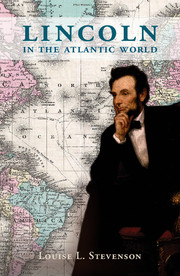Book contents
- Frontmatter
- Dedication
- Contents
- Acknowledgments
- Introduction: My Lincoln Lessons
- 1 The Second Shot Heard ’Round the World
- 2 African Lessons
- 3 European Lessons
- 4 German Lessons
- 5 English Lessons
- 6 Lessons from International Law
- 7 German Lessons for Reelection
- 8 The Last Lesson
- Notes
- Selected Bibliography
- Index
4 - German Lessons
Published online by Cambridge University Press: 05 November 2015
- Frontmatter
- Dedication
- Contents
- Acknowledgments
- Introduction: My Lincoln Lessons
- 1 The Second Shot Heard ’Round the World
- 2 African Lessons
- 3 European Lessons
- 4 German Lessons
- 5 English Lessons
- 6 Lessons from International Law
- 7 German Lessons for Reelection
- 8 The Last Lesson
- Notes
- Selected Bibliography
- Index
Summary
The winter following the outbreak of the German and Hungarian revolutions, Lincoln and about a dozen of his Springfield friends, including Amos W. French, his dentist, and William Herndon, his law partner, started to meet semiweekly in the lawyers’ office for German language lessons. The teacher, an émigré who had moved recently to the Illinois capital from Philadelphia, knew insufficient English to explain why a German word that sounded like an English word had a quite different meaning or connotation in each language. For example, in English, the word gift means a present; in German, Gift means a poison. To explain these so-called false friends, Lincoln stepped into the breach. He might tell his fellow students, “the Germans have no word for thimble; they call it a finger hat (Fingerhut).” Thus, he illustrated the nuances of meaning with stories that generated “much merriment.” Because of the ensuing laughter, “none of us mastered the language,” the dentist recalled.
Lincoln reputedly did learn a few elementary words, at least enough to tell German-American friends and acquaintances some years later that their surnames of Kaufmann and Schneider meant merchant and tailor. Along with an introduction to the language, participation in the classes may have inspired discussion of current European events, especially the activities of the Forty-Eighters and Louis Kossuth. Lincoln and Herndon's hosting the classes indicates that he must have anticipated some benefits. During the years following his term in Congress, when he supposedly had stepped away from political activity, the German lessons helped ready him for reentry. He was learning how to enlarge his political base to a new constituency in Illinois. Concomitantly, he was revising his thinking about the meaning of the Declaration of Independence to include a new and broader understanding of “all men are created equal.”
During the 1840s, approximately 400,000 Germans arrived in the United States. By 1860, approximately 1.3 million people in the United States claimed Prussia or other German states as their birthplaces. Merely 5 percent of these people resided in states that would secede in 1860–1861. In some states, especially those of the Midwest, German-born residents outnumbered Irish-born residents, the most numerous immigrant group in the entire country from the 1830s through the 1840s.
- Type
- Chapter
- Information
- Lincoln in the Atlantic World , pp. 104 - 126Publisher: Cambridge University PressPrint publication year: 2015



